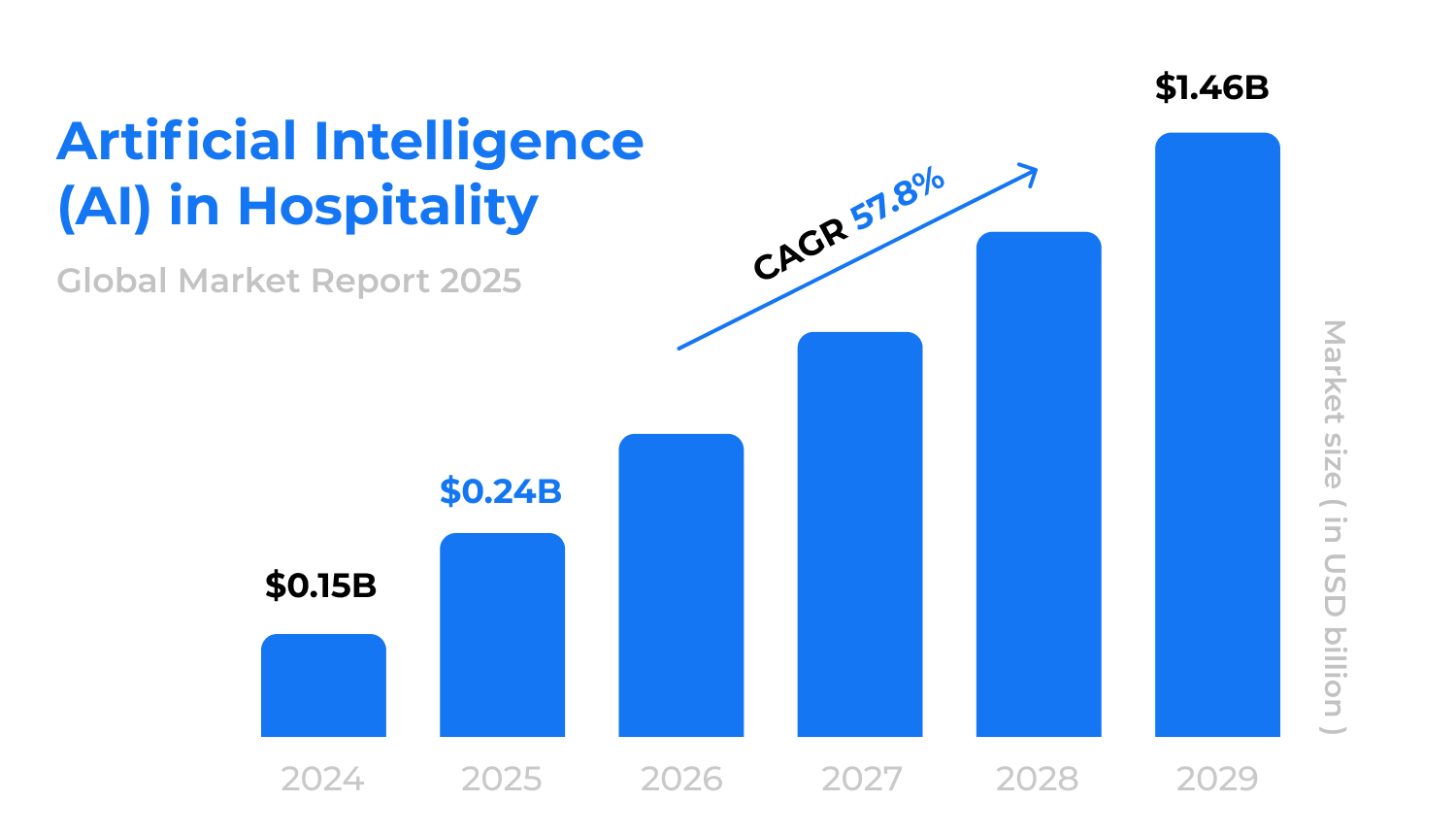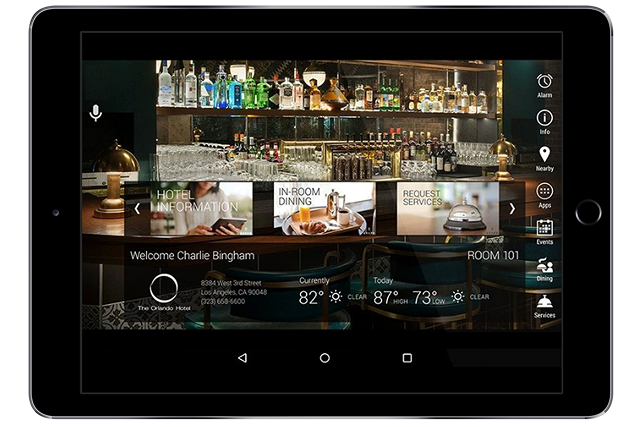Gone are the days when offering a clean room and a continental breakfast was enough to win guest loyalty. Today’s travelers expect more than just comfort — they want experiences that feel tailored to them, from the moment they book to the second they check out. This shift from standardized service to personalized hospitality isn’t just a trend — it’s a strategic transformation. And leading the charge? Artificial intelligence. The global AI in hospitality market is projected to grow from $150 million in 2024 to $240 million in 2025, with a remarkable compound annual growth rate (CAGR) of 57%.

From booking platforms that remember your favorite room type to in-room systems that adjust lighting and temperature before you even ask, AI in the hospitality industry is quietly — and brilliantly — reshaping how we define a “great stay.”
In this article, we’ll dig into how hotels and resorts are embracing the use of AI in the hospitality industry — not just as a shiny tech upgrade, but as a powerful tool to create memorable, guest-centric experiences. Expect real examples, behind-the-scenes insights, and a glimpse into the not-so-distant future of travel. Let’s explore how AI is reshaping hospitality.
Personalized Booking Experiences
Before a guest ever steps into the lobby, the experience has already begun — and increasingly, it’s being shaped by AI in hospitality. The booking process has evolved from a simple transaction to the first step in a personalized journey.
Take Hilton, for example. They’ve woven AI into their reservation system to make booking more intuitive and customized. Returning guests can select not just a room, but preferences like pillow type, floor level, nearby elevator access — even their ideal check-in time. The system learns from previous stays and booking patterns to suggest the right package, room upgrades, or amenities based on individual behavior.
This kind of pre-arrival personalization does more than impress — it sets clear expectations and starts building a sense of connection before check-in. It’s a way of saying, “We see you, we remember you, and we’re ready to make this stay yours.”
And it’s not just the big chains. Boutique hotels and independent properties are adopting similar AI-driven tools that tap into CRM data, online behavior, and even social media signals to tailor offers and communications. Whether it’s a special anniversary message, a room with a mountain view, or a nudge about a spa promotion, personalization done right feels thoughtful — not intrusive.
In an industry where first impressions matter, AI in the hospitality industry is helping brands turn booking into something more meaningful: the beginning of a personalized experience designed to delight.
AI Concierge and Guest Communication
Once a guest has booked their stay, the next frontier of personalization kicks in: real-time communication. And this is where AI use cases in hospitality really start to shine — not just as tools for automation, but as a new layer of service that’s responsive, available 24/7, and remarkably intuitive.

Take Hilton’s AI-powered concierge, Connie. Named after Hilton founder Conrad Hilton, Connie is a friendly robot stationed in the hotel lobby — powered by IBM Watson and WayBlazer — that interacts with guests, answers questions about local attractions, and provides recommendations with a surprising dose of charm. What makes Connie impressive isn’t just the novelty factor — it’s the ability to use natural language processing (NLP) to understand and respond to guests in a conversational, human-like way.
But AI concierge services aren’t limited to physical robots. Most hotels are now deploying AI chatbots across their digital touchpoints — websites, mobile apps, messaging platforms — to handle everything from check-in instructions to restaurant reservations. These bots are trained to recognize intent, answer frequently asked questions, escalate complex issues to human staff, and even follow up after a request has been fulfilled.
One of the biggest advantages here is 24/7 availability. Whether it’s 2 p.m. or 2 a.m., guests can get instant assistance — no waiting on hold, no walking down to the front desk in slippers. This level of access doesn’t just improve convenience; it reinforces a sense of control and comfort for the guest.
And the more these systems are used, the smarter they get. With every interaction, the use of AI in hospitality enables platforms to refine their responses and personalize suggestions — remembering guest preferences, anticipating needs, and delivering timely, relevant communication.
For hoteliers, it’s a win-win: operations become more efficient, staff are freed up to handle high-value tasks, and guests enjoy faster, more personalized service that still feels warm and welcoming.
At its best, AI in guest communication doesn’t replace the human element — it enhances it. It’s not about making hotels more robotic. It’s about making hospitality more intelligent, more responsive, and ultimately, more human.
In-Room Personalization: Smart Spaces, Smart Comfort
Once guests enter their room, AI continues working behind the scenes to create a space that feels less like a standard hotel room and more like home — or better. In-room personalization is where comfort meets convenience, and generative AI in hospitality is becoming the quiet operator making it happen.
Virgin Hotels has been leading the way here with their mobile app “Lucy,” which connects directly to the room’s smart systems. Guests can use the app to control lights, adjust the thermostat, stream entertainment, order room service, or even change the TV channel — all without touching a single remote. But what makes this system powerful is its integration with guest profiles. It remembers preferences from past visits and applies them automatically during check-in, creating a seamless, low-effort experience.
Here’s how AI is transforming the in-room experience:
- Smart climate control: Rooms can adjust the temperature to your ideal setting before you arrive or adapt in real time based on movement and time of day.
- Lighting automation: AI systems set lighting scenes depending on time, mood, or guest activity — whether you’re working, relaxing, or sleeping.
- Entertainment personalization: Streaming platforms can pick up where you left off last time, suggest new content based on preferences, or switch seamlessly from your mobile to the TV.
- Voice-activated assistance: Integrated voice AI (like Alexa for Hospitality) allows guests to request towels, play music, or ask for restaurant hours hands-free.
- Automatic room adaptation: Returning guests can have their preferred pillow type, minibar contents, or wake-up settings already prepared upon arrival.
All of this adds up to an experience that’s frictionless and, most importantly, personal. Guests no longer have to spend the first 15 minutes figuring out how to turn off an overly bright lamp or reset the thermostat. Instead, the room adjusts to them. In an age where personalization drives loyalty, AI in the hospitality industry is making it possible to give guests a space that “knows” them. Want to explore this for your hotel? Let’s talk 
Dynamic Guest Engagement and Recommendations
AI in hospitality doesn’t just enhance the stay — it anticipates it. From the moment a booking is made, intelligent systems begin shaping the guest journey with well-timed, highly relevant suggestions. Using real-time data and behavioral insights, hotels can engage guests with personalized messages and curated recommendations that feel less like marketing and more like helpful travel tips.
Here’s how AI is driving dynamic engagement across the guest journey:
- Personalized pre-arrival emails with relevant local tips
- Upsell offers based on guest history and trip context
- Curated restaurant recommendations tailored to dietary preferences
- Suggested local activities matched to interest profiles
- Real-time alerts about nearby events and experiences
- Dynamic in-app itineraries that adjust to weather and availability
- Location-based push notifications for on-property offers
By staying one step ahead of guest needs, the use of AI in hospitality — especially through advances like generative AI in hospitality — allows hotels to create more meaningful moments and open up new revenue opportunities without overwhelming or interrupting the experience.
AI for Operational Excellence Behind the Scenes
While guests enjoy seamless personalization on the surface, AI in the hospitality industry is doing some of its most impactful work behind the scenes. In the background, intelligent systems are quietly transforming how hotels operate — increasing efficiency, improving decision-making, and creating a more responsive business model overall.
One of the most powerful tools is predictive analytics. By analyzing a mix of historical data, current booking trends, seasonality, and even external factors like weather and local events, AI can forecast guest demand with impressive accuracy. This enables hotels to schedule staff more efficiently — ensuring they’re not over- or under-staffed during key periods — and manage housekeeping, dining services, and maintenance more proactively.
AI also supports real-time operational decisions. If a booking pattern indicates an unexpected surge, room allocations and service capacity can be adjusted instantly. If data shows that guests tend to request late checkouts after local concerts or festivals, the system can prompt staff to offer that option in advance — turning insight into opportunity.
Perhaps most importantly, there’s a growing feedback loop between guest preferences and operational data. When systems detect that guests consistently request hypoallergenic pillows, prefer early check-ins, or avoid room cleaning during short stays, those patterns inform how inventory is stocked, how services are timed, and how staff workflows are designed. Over time, this makes the entire operation more efficient and guest-centric.
AI isn’t just about automation — it’s about orchestration. It helps hotels do more with less, without sacrificing the quality of the guest experience. It also provides managers with clearer visibility across departments, enabling smarter long-term planning and stronger performance at scale. Hotels that invest in operational AI aren’t just optimizing the present — they’re building more adaptive, agile systems for the future.
Generative AI’s Emerging Role in Hospitality
Generative AI is rapidly becoming a creative powerhouse within the hospitality industry, enabling hotels to deliver personalized, scalable communication like never before. Today, it’s being used to craft tailored emails, chatbot conversations, and concierge messages that feel human, helpful, and perfectly aligned with a brand’s voice — all without requiring manual input for every interaction. It also streamlines guest feedback management, automatically generating thoughtful, timely responses that maintain consistency and care. But the real promise of GenAI lies in what’s next: dynamic itinerary generation based on guest interests and local events, real-time personalized travel content across digital displays, and even AI-generated marketing assets that adapt to changing guest profiles and booking behaviors. As these tools evolve, generative AI won’t just enhance communication — it will help hospitality brands design richer, more imaginative guest experiences at scale, without losing the personal touch.
Challenges and Ethical Considerations
As powerful as AI in the hospitality industry is, it doesn’t come without complications — especially in an industry built on trust, care, and personal connection. Hotels must balance innovation with responsibility, making sure technology enhances rather than erodes the guest experience.
Here are some of the most pressing challenges:
Data Privacy and Compliance
Hotels collect and process vast amounts of guest data — from preferences to payment info. Ensuring compliance with regulations like GDPR, CCPA, and other privacy laws is essential. Clear consent mechanisms, secure data storage, and transparent usage policies are non-negotiables.
Preserving Human Warmth
Hospitality is, at its core, human. Over-automating interactions can make experiences feel cold or impersonal. The key is to let AI handle routine tasks while freeing up staff to focus on empathy, care, and the moments that matter.
Staff Training and Change Management
Implementing AI means more than just installing software. Teams need to understand how to work alongside these systems — and some may resist the shift. Ongoing training, clear communication, and demonstrating how AI supports (not replaces) their roles are critical.
The Future of AI in Hospitality: What’s Next?
As AI capabilities grow more sophisticated, its role in hospitality is poised to evolve from enhancement to orchestration. We’re heading toward a future where every guest interaction — from browsing to booking to post-stay — is shaped by intelligent systems working quietly in the background.
This next phase is all about predictive personalization at scale. Hotels won’t just respond to guest preferences — they’ll anticipate them with remarkable accuracy. And as AI platforms become more connected, we’ll see a new level of cohesion across systems: reservations, in-stay services, marketing, loyalty — all speaking the same intelligent language.
In the future of AI in hospitality, it won’t be just a back-end tool — it will be a strategic differentiator. The brands that can use it to deliver consistently personal, intuitive experiences will have a clear advantage in earning long-term guest loyalty.
What’s on the horizon:
- Predictive personalization at scale
- Unified AI systems across booking, operations, and service
- Real-time experience adaptation based on guest behavior
- AI-powered loyalty and retention strategies
- Cross-platform personalization (mobile, web, on-site)
- Proactive service suggestions before the guest asks
- Deeper integration with IoT and smart property tech
- Voice and gesture interfaces for contactless control
- Personalized sustainability options during booking and stay
AI isn’t replacing hospitality — it’s becoming its most powerful partner. As guest expectations continue to rise, delivering personalized, seamless, and emotionally resonant experiences at scale will be nearly impossible without intelligent systems working behind the scenes. AI gives hospitality professionals the tools to focus more on creativity, human connection, and service innovation — while automating the repetitive and predicting the unpredictable. The future belongs to those who can blend technology and empathy in a way that feels natural, intentional, and uniquely tailored to every guest. In that sense, AI in the hospitality industry isn’t just part of the future — it’s helping to redefine it. Ready to bring smarter personalization to your guests?
Balancing Personalization and Hospitality’s Human Heart
Across every touchpoint — from booking to check-out — AI is helping hotels create experiences that feel more personal, intuitive, and satisfying. Real-world applications have shown how smart technology can elevate service quality, boost operational efficiency, and ultimately make guests feel seen and valued.
But as powerful as AI is, it’s not here to replace the warmth, empathy, and creativity that define great hospitality. It’s an enabler — a behind-the-scenes partner that helps teams deliver better service, not less human service.
The future of hospitality will belong to those who adopt AI thoughtfully, centering every decision around guest needs and emotional connection. When used with intention, AI can make hospitality not just smarter — but more deeply personal than ever before.
At Intellectsoft, we’ve built AI-powered functionality for hospitality clients who needed seamless, scalable personalization — without losing the human touch. Through our rigorous hiring and vetting process, we provide high-performing experts who know how to align tech with the guest experience.
Subscribe to updates
Source link













